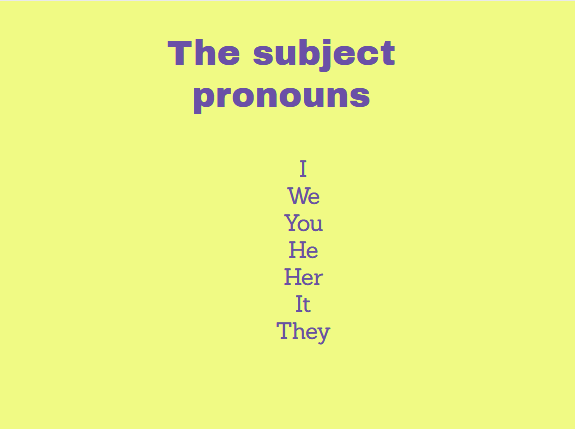What are pronouns?
A pronoun is a word used instead of a noun.
A noun is a name.
For example if we say “John cooked lunch.”
John is a noun because it is the name of the person in the sentence.
If we said “John cooked lunch and then John cleaned the kitchen” it would sound a bit strange
because we are using the word ‘John’ twice in a sentence. To stop this repetition we can say,
“John cooked lunch and then he cleaned the kitchen”.
The word “he” means we do not use ‘John’ for a second time in one sentence.
‘He’ is a pronoun, a word which is used to replace a noun.
Subject pronouns
There are different types of pronouns but words like “I, We, You, He, She, It, They” are called “subject pronouns”
They are called “subject” pronouns because they refer to the “subject” of the sentence, that is the person or thing that does the action. For example we can say “Kate wrote the book” and Kate is the subject, the person who did the action. We can replace the noun Kate with the subject pronoun, ‘she‘.

Object pronouns
Object pronouns are used to describe people or things which have an action done to them.
So for example if we were to say ‘John saw Christopher’, we cannot replace the word ‘Christopher’ with ‘he’ but have to put ‘him’.
‘He’ is a subject pronoun and ‘him’ is an object pronoun.
We have to say ‘John saw him’.
We cannot use object pronouns to refer to someone doing an action. So we cannot say ‘him wrote the book’, we have to say ‘he wrote the book’.
The object pronouns are as follows; me, us, you, him, her, it, them.
Nominative and Accusative
When we want to say that a word is a subject we say that it is ‘nominative’ or we say ‘it is in the nominative case’.
So for example:
‘Peter saw the teacher.’
In this sentence Peter is the person doing the action (the agent) and he is the subject, so we can say Peter here is ‘nominative’.
However if we say:
‘The doctor saw Peter.’
In this sentence Peter is not ‘nominative’ but ‘accusative’ i.e. he is the object.
Though words such as ‘nominative’ and ‘accusative’ may seem very technical, they are very simple.
The adjective for science is ‘scientific’, the adjective for music is ‘musical’.
The adjective for anything which is a subject (grammatically) is ‘nominative’.
The adjective for anything which is an object (grammatically) is ‘accusative’.
To test how well you understand all this you can look at the following sentences and see if your answer is correct. Choose the correct option from the words in purple. Leave your answers in the comments section and we will tell you what you got wrong or write.
- I asked him/he to help me.
- They asked me/I to write an email to them/they.
- He/Him used to teach us/we Maths.
- She/her saw Samantha with she/her in the library.
- Can you tell me/I where I can find the answer?
- We/Us agreed to cook for they/them.
- If he/him wants to pass the exam, we/us must all make sure we help he/him.
- David hit I/me by accident.
What were your answers? How many did you get correct? Leave a comment!




